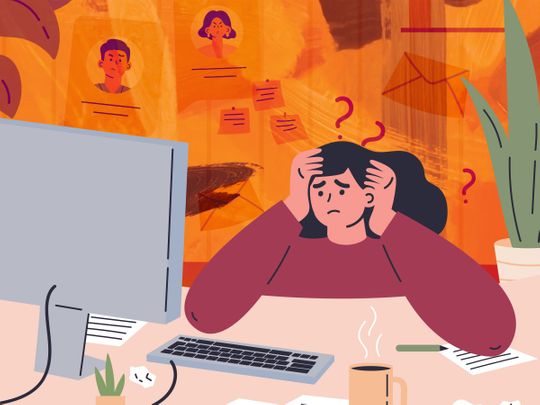Many of us are still working from home as the COVID-19 global pandemic continues to rage around the world. It’s 11 months since the new coronavirus intruded into our lives, and we are still reeling from the disruption. Lots of people have returned to the workplaces, but many others continue to work from their homes.
Homes have become offices. It’s become schools too, as online learning is seen as the best recourse to keep the virus away from children. When the office comes home, it brings the attendant stress too. And that doubles if both the spouses work. The stress levels rise by a few more notches if they are school-going children who now study from home. So stress prevails in every room of the house.
Stress is a beast. It magnifies problems: increases irritability, clouds thinking, and actions can be impulsive and counterproductive. So how do we keep a clear head in these stressful times? How do we cope with it? Is there a mechanism? Is there a strategy? We asked the people, parents, our editors, and health experts. Here’s what they said:
What people say: Distractions turned relief into frustration
Samihah Zaman and Anjana Kumar, Staff Reporters and Faisal Masudi, Senior Reporter
Wellness classes helped Shemeela Shanavas, Physics teacher
“I first started working from home on March 24. In the beginning, it was a relief from the morning hustle and bustle of reaching work on time. But soon, things became complicated and mentally tiring when we essentially became available 24/7. Another major challenge I faced was being unable to demonstrate Physics concepts practically. And then there are the days when tensions are high, simply because everyone in the house is around all day long, says Shemeela Shanavas, who teaches at the Global Indian International School in Abu Dhabi.
A major challenge I faced was being unable to demonstrate Physics concepts practically.
“I realised that I had more time at hand than before. So I started planning things ahead of time. This really helped. Early wake-up to do chores helped save an hour that I would have previously used for travelling. This time was put to good use. Evenings were spent with the family, and we began following wellness classes to enhance our physical well-being.”
Jamaican Courtnie Peart was able to focus more
Courtnie Peart, 26, started working from home in March. “I actually enjoyed the experience. I was able to focus on my work more, and I did not have to drive into work and back every day. I was also able to finish work at much the same time, says public relations executive from Jamaica.
I found myself a bit distracted when working from my room.
The only challenge was that I found myself a bit distracted when working from my room. Fortunately, our manager shared a presentation about good work habits, and she suggested that we avoid working from our bedrooms. As soon as I moved to the living room, which had more sunlight and more upright chairs, I found that it helped me concentrate better.
We now go to the office twice a week, and this is a really good arrangement. We can do work that requires more collaboration on the days when we are at the office, and handle tasks that require more focus when we are at home.”
Early start helps beat distractions at home for Noufal Manzil
Noufal Manzil, a 42-year-old employed in the Dubai insurance services sector, has been working from home since March. His four children are also distance learning from home. Manzil often has to play the “IT guy” at home to troubleshoot distance learning issues or laptop and WiFi glitches.
Since I don’t have to get ready and drive to work, I start quite early, and I can switch off earlier too. So I get to spend more quality time with the family.
“The only drawback [of WFH] that I experienced is that there are constant distractions at home, especially if you have a large family and everyone is either attending online classes or working from home. Sometimes work and life gets intertwined. My two-year-old won’t understand the need to separate work and life,” Manzil said.
His strategy to cope with the distractions is simple and effective — wake up early, before the children are up, and get a lot of work done ahead of time. “Since I don’t have to get ready and drive to work, I start quite early, and I can switch off earlier too. So I get to spend more quality time with the family.”
Manzil now goes to the office twice a week. He expects to retain the positives in work practices even after the pandemic is over.
Frenchman Guillermic creates an office space at home
Self-motivation and self-discipline were the biggest challenges for Ronan Guillermic, 39, while working from home. “For me personally, the biggest challenge is your own motivation and self-discipline. There are days when I am low on self-motivation and I push myself up to be on the job. But having said that I am more inclined towards a balanced work set-up where you work half the time from home and rest in the office. It is the perfect work-life balance.”
I converted a room into an office space with all accessories, including a printer and scanner. When I enter this room, I switch myself to office mode.
As a senior manager, Guillermic work is not monitored every day. So the onus is on him to do the job with full responsibility. “I converted a room into an office space with all accessories, including a printer and scanner. When I enter this room, I switch myself to office mode.” Guillermic recommends this for everyone, adding that the size of the space doesn’t matter. “Essentially, it should be a space in your house where when you enter, you automatically calibrate your mind to work.”
Guillermic misses the office. “There is so much good energy when you work in a team.”
Being single is an advantage for Lebanese Sabine Assaf
Sabine Assaf, 28, lives alone. That has helped in working from home “As a single person, I find myself more productive while working from home. You should have a proper set-up to put yourself in the mood for work, and then you are all set.
The office vibes are amazing. At home, there can be distractions with family unless you have a proper work-like set-up at home.
A graphic designer from Lebanon, Assaf is now back to working in the office for the most part of the week, and she is enjoying it. “The office vibes are amazing. At home, there can be distractions with family unless you have a proper work-like set-up at home.”
She sets a time at home just like she would at the office to manage her work. “I live with my parents and a little brother so there is little responsibility at home for me. So it is less stressful, and I can get on with my work at home. I just have to manage the distractions of guests coming into the house.”
How parents cope: Juggling work and children
Tabitha Barda, Baby and Child Editor

Image Credit: Supplied
A double-edged sword for Namita Tandon
The ability to work from home has been a double-edged sword for parents like Namita Tandon, a Dubai-based mother of two boys (6 and 9) from India who works for an industrial automation company. “Honestly, I hate working from home — more so when my kids are around,” she says. “There seems to be no work-life balance. Even though I spend more time at my desk when WFH, less work seems to get done. I also miss being able to just switch off from work — the demarcation is all blurred now.
As the mother of school-aged children, Namita has also had to juggle her own work with supervising her sons’ homeschooling, which she says has been very stressful. “And the mum guilt weighs too heavily with home-learning as well — when their school work is not completed, or they are just spending endless hours idling away or in front of a screen as I just need to get my own work done and can’t afford the time to focus on them.”
She says she was the first one to run back to the office when restrictions eased and her kids were able to return to school, but that she struggled on the occasion when their lessons switched back to home learning for two weeks due to a positive COVID case in one of their classes. “I’ve reached a stage where I don’t want to be trying to work at home while around my kids anymore,” she says.

Image Credit: Supplied
Briton Lora Jayne loved the flexibility
However, many parents have found the flexibility that comes with WFH to be a huge benefit: Lora Jayne, a Dubai-based marketing and brands specialist from the UK and mum to Leo, aged nearly 2, says, “The ability to work from home has changed my life for the better in so many ways. I’ve loved it in terms of having the flexibility, being able to plan my day how I want it, and being able to see Leo actually grow up and not feel guilty for missing out on anything.
“Although I think you can get a bit of cabin fever and a bit of social anxiety if you are inside alone for extended periods of time, I do think the positives outweigh the negatives. And in terms of work, it hasn’t affected my working output at all. I think I’ve worked harder if anything.
“It’s true that you do tend to start your day earlier and finish it a bit later when working from home, which could be seen as a negative. I think you do have to be strict on yourself when it comes to work/life balance and it takes a while to get used to that. But for me I think I work better at home — I’m less distracted, I’m happier, I feel more positive, so all of those things obviously feed into me wanting to work really hard.”

Image Credit: Supplied
More time with the daughter for Nazaakat Tharani
Nazaakat Tharani, a British/Indian management consultant working in Dubai and mother of a one-year-old daughter says she also sees many benefits: “Spending time with my daughter in my lunch break or in the mornings when I would have been otherwise rushing to commute; being able to cook family meals at home without as much time pressure; being able to do some exercise myself during gaps between meetings, rather than only in the evening (which would take away time from seeing my daughter); having the flexibility to do some life admin tasks during the day because I know I’m going to need to work into the evening — it’s all really helpful.”
There are some drawbacks, she admits: “Sometimes it can get a bit boring, and I have to go out of the house and sit in a coffee shop because I get cabin fever. Also the background noise of my daughter has become a general feature of my online meetings and conference calls — and depending on the client that can be seen as either a positive or a negative! But for the most part my clients and colleagues have grown to accept this reality. And in terms of working output I think it’s probably the same or even better. I have always enjoyed working from home, even when studying at university, so it doesn’t impact me much.”
But it’s clear that WFH doesn’t work for every parent — even those in the same family: “My husband, who is a teacher, hated every minute of distance learning,” says Nazaakat, “he would lesson-plan outside the home as he likes the separation.”
How Gulf News editors beat the stress
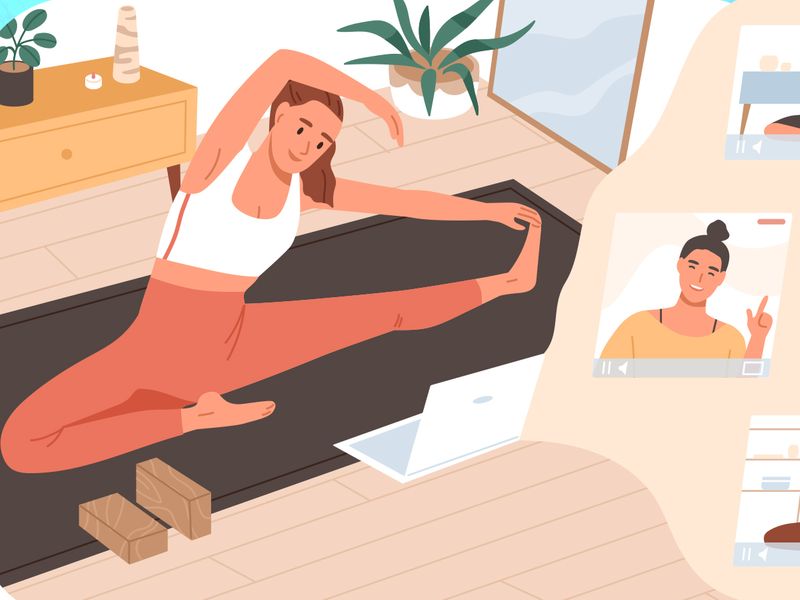
The art of doing nothing…
Anupa Kurian-Murshed, Senior Digital Content Planning Editor
Coping with stress — yoga, meditation, controlled breathing, exercise… the options are endless.
Personally, I’ve thrived on the Danish concept of hygge — which means staying at home and being comfortably lazy.
Then, the world turned upside down. COVID-19 happened. Suddenly, my home was my office, my craft space my desk. And, hygge was not such a relaxing idea anymore. The work hours and waking hours became one, and slowly stress increased.
I decided that perhaps the Swedish idea of lagom, of doing all things in moderation, might be key. But, as projects increased and deadlines loomed, I became a hunched figure tapping away on my keyboard in the blue light of a 24-inch monitor, who only moved away to eat or sleep. As expected, this was fine for a bit, but after a while exhaustion hit like a ton of bricks.
Enter the Dutch concept of niksen, which literally means the art of doing nothing. The point is not to be productive at all. I remembered that I was rather good at this as a child too, enough to stress my mum out. So, just needed to hit the rewind button and reboot memory. Took a while, but it all came back and has definitely helped, even if it is in small measures.
As we all know, in these tough times, every little thing helps.

Stress hasn’t eaten me up yet
Babu Das Augustine, Business Editor
I had looked forward to working from home when the idea was mooted and welcomed the office decision with enthusiasm.
The excitement was linked to fringe benefits like getting up late, avoiding morning and evening traffic, escape from ironing and even the bare minimum of grooming to make myself presentable for the office.
I did enjoy these for the first few days. Then came the slow realisation that working online has a small problem: the office never closes, and the work could come looking for you at any hour of the day or night.
A few weeks into the routine, I began to take it in my stride. That is when the wife started to delegate some of the housekeeping functions on an incremental basis. It all started with doing dishes after lunch and dinner, making the beds, and then slowly got introduced to mopping the floor and cleaning bathrooms. Of course, I am not complaining, believe me, these were not very stressful.
Stress kicked in when the wife decided to pack her bags and go to India due to an emergency, leaving both kids under my charge for a month. Well, that called for showing some minimum parenting skills such as cooking three meals a day and getting them ready early enough to attend their online classes and occasionally helping with their assignments.
The real challenge has been in dealing with their tastebuds and presenting something on the table that is palatable. One likes vegetarian, and the other hates it. One likes it spicy, and the other despises it. In a few days, I realised that my culinary skills are woefully inadequate.
Of course, I didn’t give up, cooking all kinds of exotic items. I downloaded recipes of celebrity chefs and attempted to clone them in my kitchen. For some strange reason, the output always had a smoky flavour despite varying the combinations and permutations of spices and other ingredients.
A couple of months into working from home, there isn’t a single utensil that has not burned. Some of the Teflon-coated ones, which I suspect my wife considers dearer than me and the kids, have multiple layers of carbon coating and are beyond recognition. The building’s security guy considers me enemy number one because the fire alarm went off a few times when my cooking went out of control.
Despite all this, stress hasn’t eaten me up. On a positive note, now I know how many minutes it takes to hard boil an egg or how many whistles it takes the pressure cooker to cook rice to edible levels.
The trade-off between pressure cooker whistles and office deadlines can be challenging, but I suspect that is keeping me sane in these difficult times.

Music in my space is therapeutic
Jennifer Barretto, Assistant Editor – Features
Who would have ever thought working from home would feel so much like work? Sometimes, it can be more stressful than the regular workdays I was used to. It boils down to feeling like you’re stuck in a hamster wheel that you get off, only to step into the cage you’ve been stuck for weeks. Then repeat the cycle from the cage into the hamster wheel.
What has saved my sanity is living in a space that’s large enough to move around. I can get up from my desk and move to a different space, and the simple act of removing myself from my desk changes my mood. With the weather getting better, even taking a moment to step into the balcony for a breath of fresh air can help clear my head. (This is a great privilege and I can only imagine the added stress of working in a home that’s small or shared, or both!) If your space does not allow a lot of moving around, routinely getting up from your chair and stretching in place can be helpful.
Another simple tactic to cope with the stress of working from home is listening to music. I tend to opt for pre-made playlists on Spotify that target stress relief and promote a sense of calm. They have no words, just ambient, soothing music that doesn’t interfere with my brain while typing or talking on the phone. When I’m feeling a bit frazzled, just a few minutes of an uplifting song can also boost my mood. The best part? Since I’m at home, you can blast it at any volume I like!

Short breaks allow me to cope with stress
Shyam A. Krishna, Senior Associate Editor
Working from home: there’s no start and finish line. At least that’s my experience. You log on to the office server with coffee in hand. Meetings on Teams and Zoom follow work. That’s followed by more work. In between the phone keeps pinging with WhatsApp messages. By the time you log off, the work hasn’t finished. That can only mean an early start tomorrow. Isn’t this stressful enough?
That’s not all. In between, the daughter who’s attending classes online interrupts with her doubts and questions. Lunch is called, and I never make it on time. If a bulb is fused or the kitchen sink is blocked, you become the electrician and the plumber. And office work goes for a toss. Soon you’re trying to catch up, and that means more unfinished work. When do I watch The Crown?
How do I cope? I raid the fridge and the kitchen cupboards. Snacking helps me concentrate. Well, I’ve piled on five kilos. Morning walks have stopped, but yoga is in. It helps. Especially since I sit hunched over the desk for hours.
When I become conscious of sitting at the desk for an extended period, I walk away and talk to my wife or daughter. Sometimes, I may telephone a friend. It works for me. When I resume work, I can look at it from a fresh perspective.
I missed office, the morning routine of getting ready for work, and the drive to the office. The office has a soothing effect on me. It’s a place where I feel comfortable. A comfort zone. I’ve started going to the office again. And I love it.
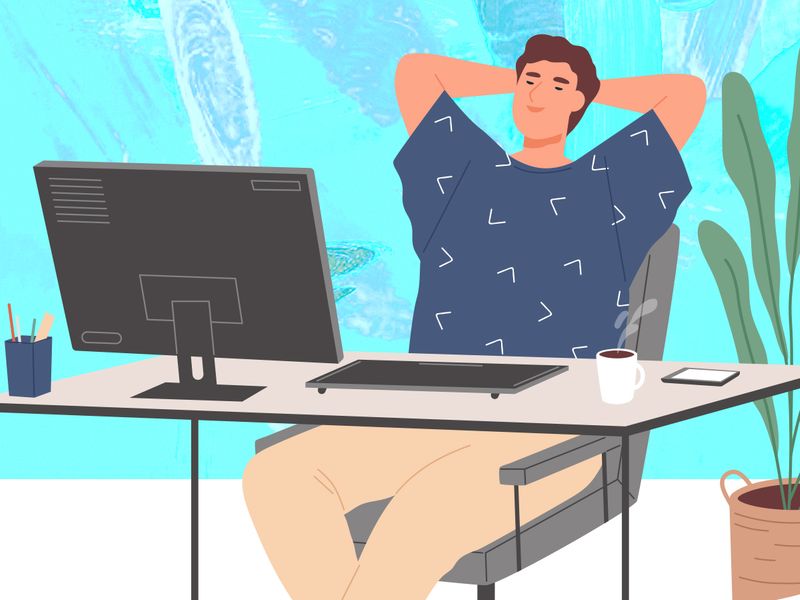
When work became a stress-buster
Gautam Bhattacharyya, Senior Associate Editor
When ‘WFH’ kicked in around the first half of April, I greeted it with scepticism. To me, working from home was associated with the IT sector or consultants who make a living off PowerPoint presentations or men who trade stocks online. Surely, it not my cup of tea.
It came soon enough. Eight months later, it has changed the landscape of my profession. If it was a welcome diversion in the initial days, things started falling into a pattern. Soon the media industry all over the world had embraced a new workflow.
If the flexibility of working from home gave us the liberty to use the home work station as one’s office, it has also ensured that there was no escape from this ‘office’.
As a sports journalist, I’m used to slogging through the late hours while covering major international events. However, this new digital work ethic meant that there were no ‘deadlines’ at all; match reports, analysis or breaking stories cannot wait till the next day.
So we had to adapt. When the Indian Premier League (IPL) came to the UAE, the daily schedule became punishing. Live blogs of matches, Zoom interviews with cricketers, and regular reports called for 12-14 hour days and irregular weekends.
Talk about a punishing schedule, and this was it. It was perhaps the high I needed to beat the stress levels. Life goes on. I am on the lookout for the next round of adrenaline rush to keep me going!
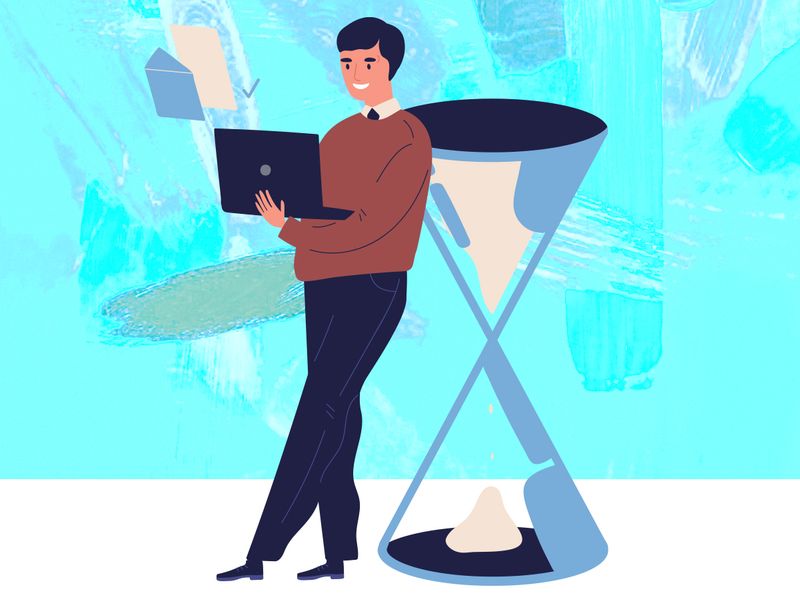
Work from home with a mind that can roam!
Sanjib Kumar Das, Assistant Editor
Right in the middle of one of the worst health crises in the world, I had to travel to India, wearing a face shield for almost five-and-a-half hours. I spent three nights and ran endless errands at a cancer care centre in Kolkata; and used cab-hailing apps in the humid eastern Indian metropolis with cabbies refusing to turn on the AC for fear of spreading the coronavirus. And like millions around the world, I have been working from home since the World Health Organisation declared COVID-19 a pandemic in March.
While grappling with the ‘new normal’ that includes hand sanitisers and face masks, I have stopped glancing at the wall clock or the wristwatch to check the time of the day. Time for me now — during the sunlit hours — is more a matter of gauging the level of illumination outside. That’s something I became conscious only after I ‘brought’ the office home!
How do I cope with the pandemic-induced stress of working from home? I have started following a few simple rules ever since I realised that work-from-home would be the norm. The good old laptop — long relegated to the inner recesses of the cupboard by the marauding smartphone — has made a glorious comeback on the living room centre-table. But I keep that 14-inch LED screen out of sight once I log off for the day. Secondly, on my workdays, I stick to fixed mealtimes — just as I’d do on a pre-pandemic day in the office. Thirdly, I wear a separate set of clothes even while working from home, to ensure that the progression of the day into the twilight hours and the evening into the night appears to be as less seamless as possible.
And finally, I keep telling myself not to cringe, even when life throws a curve ball at you. After running endless errands for mum at a cancer care centre in India for more than a month now, I have realised how effortlessly I pushed the fear of coronavirus away to face a more challenging situation.
So while at work from home, I’d look forward to catching up on all those missed episodes of Lucifer or Mirzapur or whatever … or keep myself occupied by Googling about the college or university for my son’s admission, during post-work hours.
And I never missed out on an opportunity to step out during my weekends and hit the ‘reset’ button! Remember, ‘time is what you do with it’.

A drive to nowhere while yearning for the past
Alex Abraham, Senior Associate Editor
I still remember the day I logged in to the office network for the first time from home eight months ago. It seemed cool. I could access everything that I used to do in the office from the comfort of my home. I had heard about IT professionals doing this, and I felt a sense of accomplishment in achieving this milestone.
The excitement lasted only a few days. What had seemed so unique at first became routine and mundane very soon. What was meant to be used in emergencies, became a regular affair thanks to the coronavirus pandemic. The joy of working from home gave way to stress and an inability to get the office out of the head.
Over the years, I had adopted a method of blotting work out of my mind the moment I left the office gate — unless there was an emergency. It was a natural stress buster, allowing me to focus on other things in the few hours I had before hitting the computer again. The commute to and from office was spent listening to audiobooks. I would even wait a few minutes in the parking lot to finish listening to a chapter.
Not so now. With the distance between the office (living room) and the home (bedroom) being reduced to 10 feet, much of the simple pleasures of life seem so distant. Driving through rush-hour traffic was once a chore, but I look forward to it now. Parking the car eight minutes away from the office in a free parking lot seemed cumbersome once, but I long for the fresh air I got while walking to the office. Eating out of a tiffin box five days a week seemed dreary, but I miss the company of friends and the light-hearted banter.
The brain is a tangled mess by the time the weekend arrives. The stress is more mental than physical — meeting deadlines and ensuring that stories are not missed. With less time to unwind at the end of the day and the mind constantly at work, I have realised that going for a long drive over the weekend can be relaxing. It can be a drive to nowhere, but the fact that we are many miles away from home seems to take some of the stress out.
Working from home has had many benefits too — mainly in terms of spending time with the family. I have a good idea now of what is being taught in my son’s school and whether he is up to speed. I have attended worship services and prayer meetings online regularly, something that would not have been possible if I had to be part of them physically.
The human body is an amazing creation, adapting to changing circumstances and influences. It is only a matter of time before it gets used to the new normal, finding new ways to counter the stress of working from home.
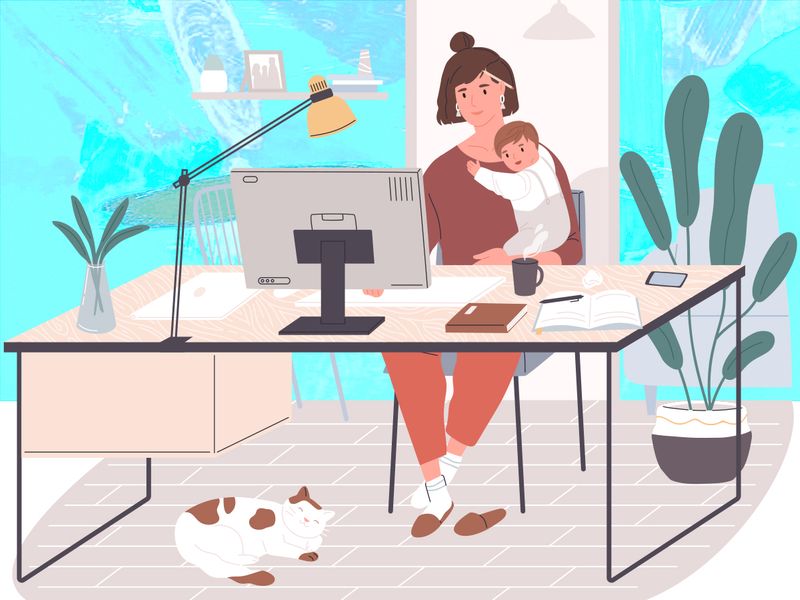
Children, cats and yoga keep me grounded
Samihah Zaman, Staff Reporter
When the COVID-19 outbreak left me working from home, I wasn’t particularly worried. In those initial days, I was thankful just to have the job, and the ability to do it from home.
Sure, I often had to drown out the sound of my children and their sibling revelry as I pounded out a news story. Every now and then, I had to set up my five-year-old for his online classes. But these weren’t insurmountable challenges. Until I realised that work has been spilling into my ‘home life’.
Updates to COVID-19 regulations are announced late at night, and in the world of online news it has to be published as soon as it is released. Even otherwise, a journalist doesn’t have regular working hours, but the stress of the pandemic and the inability to unwind have compounded the state of our mental health.
At this point, I decided to keep active at home. Every day, I found at least 30 minutes for a fitness app-guided yoga and aerobics workout. The children also bought into the idea that the stretching and the in-position sprinting was fun. So, workouts became fun for the family.
The children are very young, so they are less aware of the coronavirus and its perils, so a simple conversation helps me relax. Then there are our cats who act as the ultimate stress-busters.
Working from home did blur the lines between the workplace and the home. But I’m lucky. With the children, our furry friends and a yoga mat, the stress is not particularly difficult to beat.
What to do when work-life balance breaks?
Biju Mathew, Online Editor
The thin line separating work-life balance collapsed with the outbreak of COVID-19 pandemic. The separating wall between the office and home disappeared, work from home became the only reality for many. Its impact on the human mind and the stress it creates varies from person to person.
Here is what UAE-based clinical psychologist Dr Melanie C. Schlatter has to say about maintaining a healthy work-life balance.
Importance of keeping boundaries and having a plan
Just because you are working from home does not always mean that things are going to be more relaxed and comfortable. It’s still very important to keep boundaries of time for your work so that you can truly switch off afterwards and then focus on the other parts of your life that are important: hobbies, family, sport and so forth.
Your brain appreciates some semblance of structure, routine and predictability as it is less likely to induce stress-induced bouts of panic and feelings of disarray, so boundaries should reflect consistent habits and timing: Wake and sleep times, defined periods for work, eating and exercise and household duties.
Naturally, there are going to be exceptions, such as people working within different time zones, or people with families where interruptions can be rife, but still try to carve out relevant blocks of time where possible. If you can stretch yourself to waking up and having a quiet time to plan the day (or likewise the night before) then all the better. Knowing the game plan in advance gives you a feeling of control, even if you have a lot to contend with.
Keep a schedule
Hold yourself to the same standards as if you were going to the workplace: being clean and wearing appropriate attire and being on time, accountable and responsible. Start with the hardest, most pressing work first. You may like to introduce cues to working: putting on fragrance, making a cup of coffee, brushing teeth, setting the alarm, or moving to the work zone of the house.
“I even know someone who brings her handbag into her home workspace! This way, you can avoid feeling guilty about complacency or laziness, or like you are slipping behind if other unexpected interruptions occur during the day.”
Personalise your workspace
Seek support and respect for your work needs (including routines) and workspace: perhaps your need for space, peace, orderliness, private calls and so forth.
Personalise your workspace to make it inviting and calming: put things around you that signal good vibes and ease. Plants, photos, good lighting, an oil burner or similar. Having a fast computer or internet connection is essential for most tasks and less frazzled nerves too.
Avoid distractions
It’s much easier to take liberties when no one is watching, so make a list of the things that distract you if you can’t use them responsibly, and put them aside where possible: social media is a good example.
Being connected
Video calls can be great for connecting with others and lessening feelings of isolation, but where possible, try not to schedule them one after the other. Leave a little time to refresh yourself in-between.
Remember, the day is over
Just as we should have cues to begin work, we need to them finish also — to signal to the brain that the ‘day’ is over and new things are about to begin. Know when to stop. Just because it would be easy to hop on the phone, the computer again after-hours, doesn’t mean that you should.
Self-care and calming down
Follow up with the incorporation of self-care and time for calming down and winding down too. Getting out into the sun, exercising, staying hydrated, swapping alternate coffees for herbal teas, doing breathing exercises, safe socialising and having a laugh and having baths are all winners for calming and disconnecting the mind.
Aim for a good day
At the end of the day, if you can get all the necessary work completed, then it’s a good day, but not if it has meant sacrificing your mental health, energy and time.
5 tips for dealing with stress when working from home
Dona Denin, Assistant Online Editor
Set up your space and don’t let it go
Create a physical space for you to separate ‘home’ from ‘office’. This could be a fully equipped room with a door that can be closed or a section of your dining table with a comfortable chair. The essential part is to separate a working space that is clean, efficient, comfortable (but not the couch or the bed).
Make sure you have a comfortable seat with back and neck support and a straight surface to place your laptop. Once you have that, try to make sure you have easy access to power points. The best place would be to be near a window, for some natural light and a break for your eyes when you need it. Personalise the space in little ways you can.
If you live in a small space and can’t get a desk, get a small laptop table for Dh20, or so that will give you a straight surface to work from while choosing a specific section of the room for work.
Family time vs work time
While schools have reopened, many children are still following online classes which require an adult’s supervision, and this also leads to a full house. Children have more access to parents who work from home, and this can affect their working hours. At the same time, work stress may not permit parents to give full attention to the child’s needs which otherwise would have been met, at school or with outside help.
The answer to this dilemma is to create a balance through time. While you cannot completely shut yourself off work unless you have full-time help, explain to children the concept of working from home. Make sure they know that you will not be free to attend to them at all times and make siblings responsible for each other’s actions. Give them a timetable of when they can approach you for their non-essential requirements which could be once in an hour or two. When children do their school work silently, you will have peace of mind.
If you and your partner both work from home, you can alternate breaks so that children get more attention. Make sure their lunches and snacks are ready and that they have their chores to do after school work so that you don’t have to move away from work too many times. Also, take necessary precautions to prevent any safety incidents with the children while you’re at work.
Take a break to move around
Stretching or taking a small deep breath can do wonders when working from home. Every hour, take 5 minutes to stretch or take a few steps within your home. Use this time to hydrate and drink water, while giving your eyes some rest away from the screen.
Going outside for a walk or run before or after work can also do wonders for your mind. It can be your alone time away from the chaos of home and office.
Habits and routines
Humans are creatures of habit, and a set routine will save you from a lot of stress during work from home. The routine should help ensure you’re able to switch on and, more importantly, switch off from work. Prep meals as you would for a regular working day and mark out a time for meals or snacks.
Set up a starting routine which could be a general sprucing up, a glass of water and sending out your first work message. After work, create a habit that signals to your mind and body that you have signed out of work mode. This could be as simple as taking a quick shower and changing into comfortable pyjamas or going for a short walk. It could even be a nice cup of tea with your family. Our mind is all about habits and signals, so this can help you switch off more easily.
Make a mental rule not to check emails beyond a certain time — if you cannot do that, slot out a specific amount of time to do this and prioritise your replies. This could mean checking your emails every hour for 5 minutes post-signing out and replying only to critical emails.
Call your friend or colleague
Yes, you’re already constantly in touch with your colleagues over IM, emails and virtual meetings but one face-to-face interaction online with a work friend can help make you feel better. Take out 5 minutes to check how your colleague is doing and try doing that through a video call.
If you feel concerned about something, don’t text and wait, make a call, exchange pleasantries and talk it out. As social creatures, we are not designed to be isolated at all and working from home can be lonely even though you’re connected all the time.

